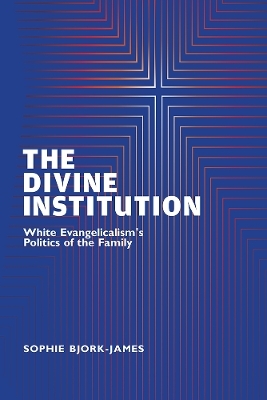
The Divine Institution
White Evangelicalism's Politics of the Family
Seiten
2021
Rutgers University Press (Verlag)
978-1-9788-2185-9 (ISBN)
Rutgers University Press (Verlag)
978-1-9788-2185-9 (ISBN)
Provides an account of how a theology of the family came to dominate a white evangelical tradition in the post-civil rights movement United States, providing a theological corollary to Religious Right politics.
The Divine Institution provides an account of how a theology of the family came to dominate a white evangelical tradition in the post-civil rights movement United States, providing a theological corollary to Religious Right politics. This tradition inherently enforces racial inequality in that it draws moral, religious, and political attention away from problems of racial and economic structural oppression, explaining all social problems as a failure of the individual to achieve the strong gender and sexual identities that ground the nuclear family. The consequences of this theology are both personal suffering for individuals who cannot measure up to prescribed gender and sexual roles, and political support for conservative government policies. Exposure to experiences that undermine the idea that an emphasis on the family is the solution to all social problems is causing a younger generation of white evangelicals to shift away from this narrow theological emphasis and toward a more social justice-oriented theology. The material and political effects of this shift remain to be seen.
The Divine Institution provides an account of how a theology of the family came to dominate a white evangelical tradition in the post-civil rights movement United States, providing a theological corollary to Religious Right politics. This tradition inherently enforces racial inequality in that it draws moral, religious, and political attention away from problems of racial and economic structural oppression, explaining all social problems as a failure of the individual to achieve the strong gender and sexual identities that ground the nuclear family. The consequences of this theology are both personal suffering for individuals who cannot measure up to prescribed gender and sexual roles, and political support for conservative government policies. Exposure to experiences that undermine the idea that an emphasis on the family is the solution to all social problems is causing a younger generation of white evangelicals to shift away from this narrow theological emphasis and toward a more social justice-oriented theology. The material and political effects of this shift remain to be seen.
SOPHIE BJORK-JAMES is an assistant professor in the anthropology department at Vanderbilt University in Nashville, Tennessee. She is the coeditor of Beyond Populism: Angry Politics and the Twilight of Neoliberalism.
Table of Contents
Chapter 1: From Rules to a Relationship: The Transformation of US Christianity
Chapter 2: The Divine Institution and the Segregated Church
Chapter 3: Evangelicalism and a Strict Father Theology
Chapter 4: Same-Sex Attraction and the Limits of God’s Love
Chapter 5: Paternal Politics
Chapter 6: Losing (and Remaking) My Religion: The Transformation of White Evangelicalism from Within
Conclusion: White Evangelicalism in Trump’s America
| Erscheinungsdatum | 25.03.2021 |
|---|---|
| Zusatzinfo | 1 b-w image |
| Verlagsort | New Brunswick NJ |
| Sprache | englisch |
| Maße | 152 x 229 mm |
| Gewicht | 426 g |
| Themenwelt | Religion / Theologie ► Christentum ► Kirchengeschichte |
| Religion / Theologie ► Christentum ► Moraltheologie / Sozialethik | |
| ISBN-10 | 1-9788-2185-9 / 1978821859 |
| ISBN-13 | 978-1-9788-2185-9 / 9781978821859 |
| Zustand | Neuware |
| Haben Sie eine Frage zum Produkt? |
Mehr entdecken
aus dem Bereich
aus dem Bereich
von Athanasius bis Gregor dem Großen
Buch | Softcover (2024)
C.H.Beck (Verlag)
CHF 18,90
mein Leben mit Benedikt XVI.
Buch | Hardcover (2023)
Verlag Herder
CHF 39,90


